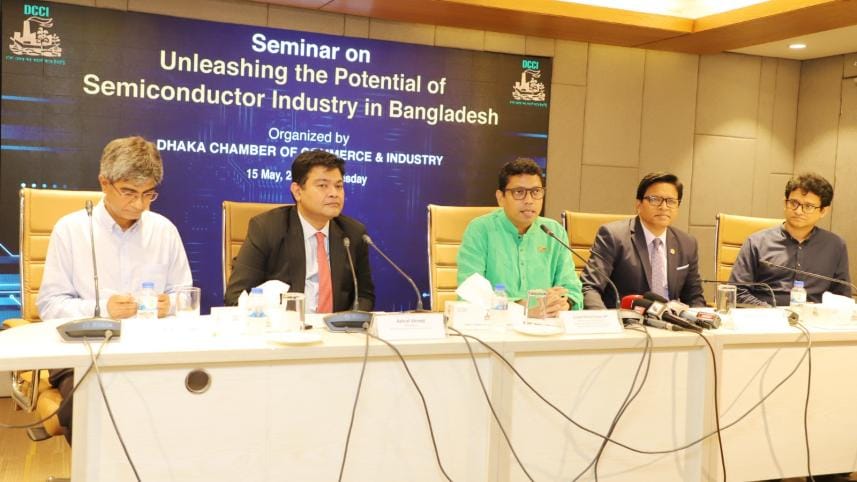Semiconductor makers have potential to earn $10 billion by 2041: Palak

Bangladesh would be able to earn $10 billion from semiconductor manufacturing by 2041 if proper policy support is ensured, according to Zunaid Ahmed Palak, state minister for telecom and ICT.
The uses of microchip and nanochips is growing day by day, so with the right policy support, it will be possible to earn at least $10 billion from exporting semiconductor items by 2041, he said.
Semiconductors are materials with electrical conductivity between conductors and insulators.
Chips, or integrated circuits, are made from semiconductors and serve as the backbone of modern electronics, powering devices like computers, smartphones and other digital technologies through their intricate circuitry.
He said there is a need for a semiconductor policy for the faster development of this sector.
He also urged for an industry-academia collaboration to create a highly skilled and technologically advanced workforce compatible for this sector as the demand is very high at home and abroad.
Palak was speaking at a seminar, titled "Unleashing the potential of the semiconductor industry in Bangladesh", organised by the Dhaka Chamber of Commerce and Industry (DCCI) at its office in the capital.
"We will focus on building 50,000 skilled manpower on microchip designing. Also, we are putting more emphasis on research and development," he said.
Palak informed that the government will invest in startups that work with chip design.
DCCI President Ashraf Ahmed suggested that for successful implementation of import substitution and export diversification, Bangladesh should prioritise the development of the semiconductor industry.
"Many countries are investing heavily in the semiconductor industry, creating a high demand for skilled workers," he said.
Besides, the government should focus on cultivating the skilled workforce required to meet the growing demand of the semiconductor industry in Bangladesh, he added.
He also underscored the importance of simplification of administrative procedures for setting up semiconductor businesses, including licensing, permits, and import/export regulations.
Mir Shahrukh Islam, managing director of Bondstein Technologies Ltd, said the semiconductor industry in Bangladesh is still at a very early stage.
"The high ambition of the government to scale it up to $1 billion from $5 million at present within the next six years would require significant improvement in the talent supply side," he said.
"We need to involve Bangladeshi diaspora global talents in the semiconductor industry to place ourselves in this niche market. Production linked subsidy is a must to attract FDI," Islam added.
ASMA Haseeb, a professor of nanomaterial and ceramic engineering at the Bangladesh University of Engineering and Technology, presented the keynote paper.
He said the global semiconductor market will reach $1,307.7 billion by 2032.
The main semiconductor manufacturing process includes design, chip fabrication, assembling, testing and packaging.
It is a labour-intensive industry and at least 81 percent of the world's semiconductor assembling, testing and packaging production is located in Asia.
Taiwan, South Korea, Singapore and India are few of the Asian countries that give special support to this sector in the form of grants, equity investment, favourable loans, R&D support, tax incentives etc.
But despite having a few design houses in Bangladesh with an annual market size of about $5 million, the local industry is yet to reach the expected level, Haseeb added.
GSM Jafarullah, managing director of the Bangladesh High-Tech Park Authority, Razib Hasan, co-founder and vice-president at Software Teton Private Ltd, Liakat Ali, additional managing director at Walton Digi-Tech Industries, and M Niaz Asadullah, a visiting professor at University of Reading, UK, also spoke.



 For all latest news, follow The Daily Star's Google News channel.
For all latest news, follow The Daily Star's Google News channel.
Comments